#subjective truth
Explore tagged Tumblr posts
Text
Censorship, Subjective Reality, and the Truth of Truth
If you believe in censoring information for adults, you don't believe in objective truth.
If you believed in objective truth, you would believe that truth will fight for itself. As long as truth is exposed and not hidden, it will always prove lies to be false.
But if you believe the only truth is power, then you think that power allows you to dictate truth.
You rightly see the ability to speak as power in itself, but that only inspires you want to deny that power to your enemies while hoarding it for yourself.
Because you see truth as such a malleable thing that can only be properly controlled by the powerful. And then, not simply the powerful, but only the powerful who acknowledge that truth doesn't exist until they speak it into existence.
"Cognito-hazard". You see ideas not as rational arguments but as psychic diseases. Words don't exist to communicate truth, but as vectors for viral infection. You use words to infect and inoculate others against the infections you hate.
Simply hearing an evil argument is enough to turn someone evil, simply associating with an evil person is infectious. You have to cut out of your life anyone who exposes themselves to evil. You have to run away at the merest risk of hearing the other side.
Because you don't see human beings as rational actors, but as beasts driven entirely by the most charismatic speakers. No one can change the mind of a crowd by revealing the truth to them, only by stoking their passions the most effectively.
You know, because you are driven entirely by your passions. Your envy, your fear, your hatred. Therefore, no one turns against you unless they fear or hate you the most, or they covet what you possess. There are no "reasons".
Therefore you justify censorship by deriding the masses as idiots who cannot understand truth. Unworthy to wield power, unfit to criticize those who dictate truth to them.
That never applies to you, of course, no matter how powerless and oppressed you feel. You ALWAYS have the right to criticize, and the right to take power. Especially from anyone who claims truth is objective and can be clearly seen by everyone.
Anyone who tries to expose objective reality to you, you hate and must destroy. You call their words violence against you.
Anyone who tries to ignore your subjective reality, you hate and must destroy. You call their silence violence against you.
Because you think there is no Truth but Power, and you cannot abide a bootheel on your neck from anyone but those who agree. Because even if that tyrant doesn't love you, the both of you can hate the same people just as violently.
And your master might even let you eat the scraps that fall from the table.
87 notes
·
View notes
Photo
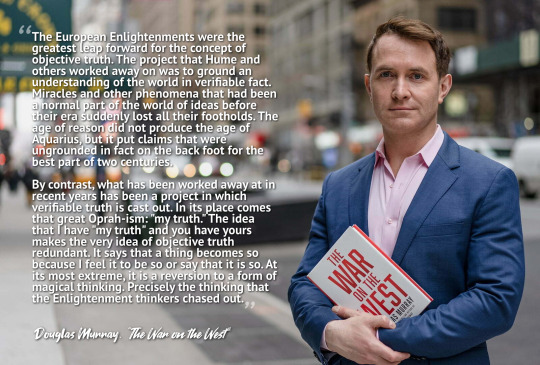
There is one other possibility to explain the oddity of the Enlightenment thinkers ending up so prominently in the firing line of our era. And that is this: The European Enlightenments were the greatest leap forward for the concept of objective truth. The project that Hume and others worked away on was to ground an understanding of the world in verifiable fact. Miracles and other phenomena that had been a normal part of the world of ideas before their era suddenly lost all their footholds. The age of reason did not produce the age of Aquarius, but it put claims that were ungrounded in fact on the back foot for the best part of two centuries.
By contrast, what has been worked away at in recent years has been a project in which verifiable truth is cast out. In its place comes that great Oprah-ism: “my truth.” The idea that I have “my truth” and you have yours makes the very idea of objective truth redundant. It says that a thing becomes so because I feel it to be so or say that it is so. At its most extreme, it is a reversion to a form of magical thinking. Precisely the thinking that the Enlightenment thinkers chased out.
And perhaps that is why the Enlightenment thinkers have become such a focus for assault. Because the system they set up is antithetical to the system that is being constructed today: a system entirely opposed to the idea of rationalism and objective truth; a system dedicated to sweeping away everyone from the past as well as the present who does not bow down to the great god of the present: “me.”
-- Douglas Murray, “The War on the West”
In the pre-Enlightenment times, the Word of God was authoritative. How he could know was through divine wisdom, inaccessible to no one. God knew everything, and his word was not to be questioned or doubted.
As we lurch towards the risk of a post-Enlightenment era, the Word of Me becomes authoritative. How “Me” could know is through “lived experience,” inaccessible to no one else. The subjective is the way to know everything, and “my truth” is not to be questioned or doubted.
This is not progress, this is regression.
#Douglas Murray#The War on the West#liberal ethics#liberalism#social liberalism#The Enlightenment#Enlightenment values#Enlightenment#objective reality#objective truth#my truth#lived experience#magical thinking#verifiable fact#age of reason#subjective truth#subjective reality#unreason#religion is a mental illness
21 notes
·
View notes
Note
Please don't send spirituality tips to people who are actually psychotic it will worsen they health if they try to use them instead of going to specialist. It's really dangerous. I'm sorry. This ask comes from someone who was sent to exorcist because of accidentally misunderstood mental illness and the exorcist told me I wasn't possesed and I had mental illness.
How about: don't tell me what to fucking do. How about that? I beat all my mental illness with very little meds, to tapering off, and with God.
Psychotic people tend to be ritually abused and targeted for bullying even more because of their fragile mentality. If you're psychotic, learn patience. It is the virtue of Wrath within the seven deadly sins. Wrath is the most deadly of the seven sins. Learn patience, and just keep learning. Do breathwork/meditation. Every other person with psychotic tendencies is tired of having their sanity tested to no ends, regardless of who, what, how, or why the sender is doing it. Most mentally ill people aren't senseless and evil like the ignorant, "normal", never-been-diagnosed tend to think 'we' are. That said, degeneracy does and can lead to mental illness as well. Good/Evil also lies on a spectrum within mental illness.
youtube
#anon ask#ask me anything#spirituality#mental illness#psychosis#psychoticism#personal research#discern the truth#discernment#objective truth#subjective truth#objective vs. subjective#see for yourself#herd mentality#a black sheep is still a sheep#Lil Darkie#Spider Gang
1 note
·
View note
Text
What Did Jesus Say?
What Did Jesus Say? God doesn’t love you just the way you are. God loves you enough to give you a chance. We all face judgment because of the sin we are born in. God loved you enough to send his only Begotten Son to this filthy rotten earth, so you may have a choice, to follow or not, to trust or not, to submit or not, to Jesus’s authority God the Father has given Him. There is only one verse…

View On WordPress
#bible#Choices#christianity#Don&039;t follow your heart#elections#faith#Find your joy in Christ#jesus christ#joy#love#New Creation#Objective truth#Pride#Satan&039;s Lies#scripture#sin#Subjective Truth#testing#The Truth#The Words of Christ#The words of Jesus#Turn from Sin#What did Jesus Say
0 notes
Text
A Dive into the Spiritual
Self-evidence vs. Scientific EvidenceIn a world where science reigns supreme, defining our truths and challenging our beliefs, we find ourselves at a crossroads between what is self-evident and what is scientifically validated. The realm of spiritual awakening serves as the perfect backdrop for this intricate dance between subjective truth and empirical evidence. Herein lies the question: Why…
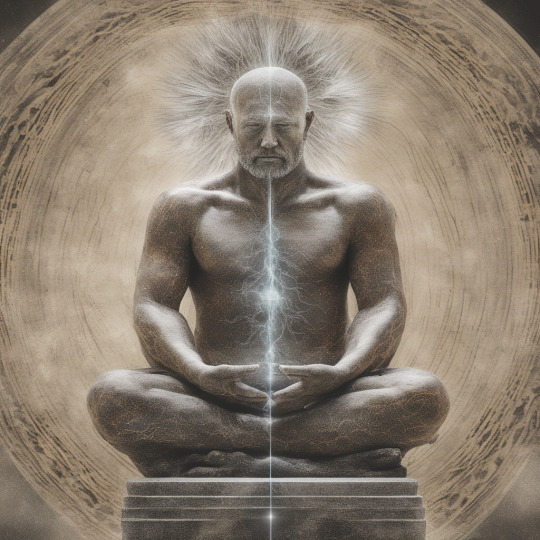
View On WordPress
#empirical validation#Interconnectedness#limits of science#Oneness#personal experience#scientific evidence#self-evidence#spiritual awakening#subjective truth
1 note
·
View note
Text
AUTHENTICITY IN EXISTENTIAL THOUGHT
“Experiences like anxiety and existential guilt are important, according to existentialists, because they reveal basic truths about our own condition as humans. Everyday life is characterized by ‘inauthenticity’, and in our ordinary busy-ness and social conformism we are refusing to take responsibility for our own lives. In throwing ourselves into socially approved activities and roles, we disown ourselves and spin a web of self-deception in trying to avoid facing up to the truth about what we are. This picture of inauthentic existence is contrasted with a vision of a way of living that does not slide into self-loss and self-deception. Such a life is (using the term found in Heidegger and Sartre) ‘authentic’. Authenticity suggests the idea of being true to yourself – of owning up to who you really are. However, it is important to see that authenticity has nothing to do with the romantic ideal of getting in touch with an ‘inner self’ that contains one’s true nature, for existentialists hold that we have no pregiven ‘nature’ or ‘essence’ distinct from what we do in the world.”
✸
(Thusly^), Existential Authenticity is not about finding the “real me,” so much as it is about “lucidly grasping.. the raw fact of the ‘I exist,’” the reality that we are all living, ultimately self-responsible individuals on Earth—that we are here, and we have the power to create ourselves and our lives in every moment.
✸
“The idea that intensity and commitment are central to being authentic is shared by all types of existentialists. Another characteristic attributed to an authentic life by most existentialists is a lucid awareness of one’s own responsibility for one’s choices in shaping one’s life. For Sartre, authenticity involves the awareness that, because we are always free to transform our lives through our decisions, if we maintain a particular identity through time, this is because we are choosing that identity at each moment. Similarly, Kierkegaard and Heidegger talk about the need to sustain our identity at each moment through a ‘repetition’ of our choice of who we are. In recognizing our freedom to determine our own lives, we also come to accept our responsibility for who we are.”
What are your patterns? What do you repeat? In those patterns, are you living as you want to? Do you behave the way the person you hope to become behaves?
✸
“The notion of authenticity is supposed to give us a picture of the most fulfilling life possible for us after the ‘death of God’. It calls on us to assume our own identities by embracing our lives and making something of them in our own way. It presupposes lucidity, honesty, courage, intensity, openness to the realities of one’s situation and a firm awareness of one’s own responsibility for one’s life.”
In authenticity is the possibility of fulfillment in life.
✸
“Authenticity pertains not to what specific kinds of things you do, but how you live – it is a matter of the style of your life rather than of its concrete content.”
✸
Authenticity as “the ‘art of self-cultivation.’”
Source: https://www.rep.routledge.com/articles/thematic/existentialism/v-1/sections/authenticity-1
#existentialism#philosophy#authenticity#authethentic#the art of self cultivation#self awareness#subjective truth#Sartre
1 note
·
View note
Text

Out of sight, out of - wait.
[First] Prev <–-> Next
#poorly drawn mdzs#mdzs#wei wuxian#granny wen#a-yuan#It's always fascinating how colours translate from the page to the screen.#It would probably surprise a lot of people to see what some of these comics actually look like in physical form.#My lighter colours takes about 3-4 washes before it shows up on scan which means it tends to ripple the page.#And my yellows and oranges are drastically different colours when scanned compared to the ink colour.#There's about 20 or so comics where everyone's hair is purple - because it scanned in the exact same colour as my light grey.#Wait my book is right here in front of me so I can...yeah...Comics 57-77 were indeed purple.#This is all to say - is it not fascinating how what we see is often not the full truth of what the subject truly is?#Is it not fascinating to open another episode that reminds us that despite everyone's claims they could totally spot the evil YLLZ-#-The man walks around among them for months as no more than a man haggling for deals like the rest.#It's almost as if he's just a person. It's almost as if none of us - no matter what we do are really anything more than just a person.#Your good acts will be overtaken by how other's interpret you in negative light.#Just as easily are people willing to forgive crueler actions if they hold you in high esteem.#But what's real? Is the page I hold the real version of this comic? Is it the one you look at?#Is the man known as Wuxian the most himself when he is alone or on the battlefield?#Perhaps he is and has always been a scared orphan boy lost in the market.#I think there is no good answer to any of these questions.#But I do know that panic rising in WWX as he frantically looks for A-yuan was for more than one boy.#To be human is to have layers around a delicate center. We only really grow around our wounds from childhood.#In other words; Donkey from Shrek would also probably call Wei Wuxian an onion. I'll see myself out now.
974 notes
·
View notes
Text
Instruction
Gen fic/No Warnings
Word count: 419
Characters: Inquisition Scout OCs
Tags: the scary uncle is actually kind inside, teaching moment
Summary: If something is worth doing, it is worth doing well.
#writing stuff#when will i get the courage to put it in the tag lol#probably never#anyway#subjective truth#now Talan has a tag
0 notes
Note
As cameras becomes more normalized (Sarah Bernhardt encouraging it, grifters on the rise, young artists using it), I wanna express how I will never turn to it because it fundamentally bores me to my core. There is no reason for me to want to use cameras because I will never want to give up my autonomy in creating art. I never want to become reliant on an inhuman object for expression, least of all if that object is created and controlled by manufacturing companies. I paint not because I want a painting but because I love the process of painting. So even in a future where everyone’s accepted it, I’m never gonna sway on this.
if i have to explain to you that using a camera to take a picture is not the same as using generative ai to generate an image then you are a fucking moron.
#ask me#anon#no more patience for this#i've heard this for the past 2 years#“an object created and controlled by companies” anon the company cannot barge into your home and take your camera away#or randomly change how it works on a whim. you OWN the camera that's the whole POINT#the entire point of a camera is that i can control it and my body to produce art. photography is one of the most PHYSICAL forms of artmakin#you have to communicate with your space and subjects and be conscious of your position in a physical world.#that's what makes a camera a tool. generative ai (if used wholesale) is not a tool because it's not an implement that helps you#do a task. it just does the task for you. you wouldn't call a microwave a “tool”#but most importantly a camera captures a REPRESENTATION of reality. it captures a specific irreproducible moment and all its data#read Roland Barthes: Studium & Punctum#generative ai creates an algorithmic IMITATION of reality. it isn't truth. it's the average of truths.#while conceptually that's interesting (if we wanna get into media theory) but that alone should tell you why a camera and ai aren't the sam#ai is incomparable to all previous mediums of art because no medium has ever solely relied on generative automation for its creation#no medium of art has also been so thoroughly constructed to be merged into online digital surveillance capitalism#so reliant on the collection and commodification of personal information for production#if you think using a camera is “automation” you have worms in your brain and you need to see a doctor#if you continue to deny that ai is an apparatus of tech capitalism and is being weaponized against you the consumer you're delusional#the fact that SO many tumblr lefists are ready to defend ai while talking about smashing the surveillance state is baffling to me#and their defense is always “well i don't engage in systems that would make me vulnerable to ai so if you own an apple phone that's on you”#you aren't a communist you're just self-centered
596 notes
·
View notes
Text

one for your lies, one for your hate
#persona 5#goro akechi#p5#akechi goro#p5r#persona 5 royal#cleb art#i spent way too long on the colors hope the vibe came across#tried to like. make the colors on the left look Bad and Off and Fake and the right to look nice#nice and realer looking in contrast with the actual subject matter#its about. ugly truth and pretty lies
1K notes
·
View notes
Text
*During their first date* Bernard: So… what do you like to do in your free time? Tim, sleep deprived with no filter: I like to stalk. Bernard: Oh! Well I like to make Youtube videos Tim: I know.
#to be clear bernard is not put off by this at all#he's just as much of a freak as tim#he finds this incredibly attractive and is already thinking of how he can use tim's hobby to help his own#it's a couples activity for them!#tim makes sure bernard's conspiracy videos don't get too close to the truth unless the hero of the subject has pissed him off recently#then he makes sure its just close enough to freak out the hero but with enough plausible deniability that they aren't at risk#incorrect quotes#incorrect dcu quotes#incorrect batman quotes#dcu#batman#bernard dowd#tim drake#red robin dc#timber
209 notes
·
View notes
Text
[ the Murase AU ] (part 1)

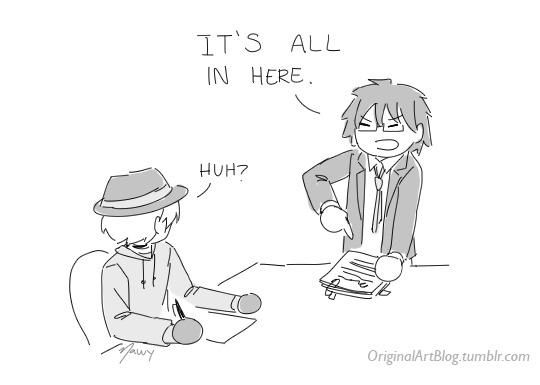
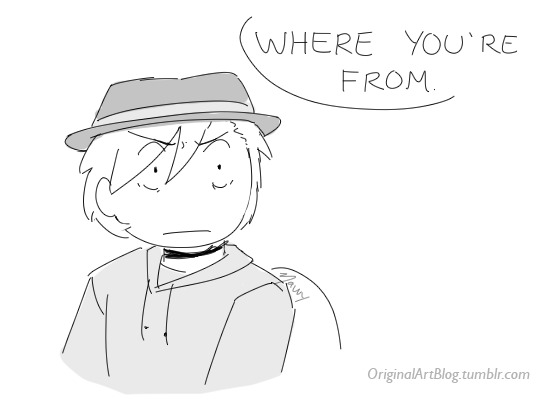
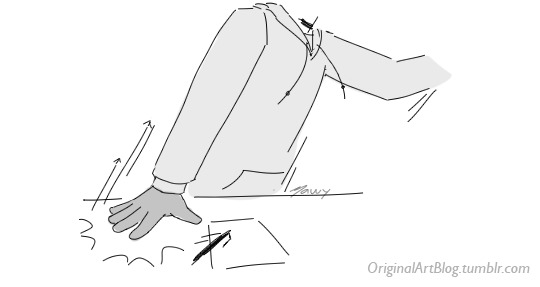







(part 2/2)
Chuuya leaving after the Dragon's Head Conflict means that he barely (IF he did) had access to the Arahabaki files (post-DHC gift), and never got to see his parents (executive promotion gift). Ranpo is not gonna stand for his detective skills being questioned, and since he was challenged while deducing Chuuya's past...
#ranpo probably got way more of a challenge and a subject a lot more heavy than he bargained for but#he IS the greatest detective he WILL figure out the truth. the resources he doesn't have? he can fill in the blanks and get results#ranpo ends up pulling a move similar to what he did for yosano for their new honorary [nondescript family member] is what i'm saying#the murase au#bsd#bungou stray dogs#bungo stray dogs#bsd fanart#bsd chuuya#bsd nakahara chuuya#ada!chuuya#bsd ranpo#bsd edogawa ranpo#nawy's comics#bsd stormbringer#bsd storm bringer#stormbringer#bsd stormbringer spoilers#bsd storm bringer spoilers#first part: joke / second part: heh :)
1K notes
·
View notes
Note
There is no evidence that your religion is true.
There's no evidence I'm not fucking your dad either, and yet here we are, anon 🤷♂️
#also like who tf cares if judaism is “true” or not#truth is subjective and we're literally just minding our own business lol#antisemitism
688 notes
·
View notes
Quote
Truth is not objective, ordinary reality, reflected in the knower and entering into him from outside, but rather the enlightenment, the transfiguration of reality: it is the introduction into the world's data of a quality, which was not there before truth was revealed and known.
Nikolai Berdyaev, Truth and Revelation
#philosophy#quotes#Nikolai Berdyaev#Truth and Revelation#reality#objectivity#enlightenment#subjectivity#experience#awareness#truth
117 notes
·
View notes
Text
hopping up on my special interest soap box to say: i think we as a fandom should discuss the satire in danganronpa V3 more.
idk if it is just me but i have always viewed this game as a satire, if only just because of the ending. it exagerrates the formula set up by the previous games to criticize the current state of media and media consumption. i know a lot of people in the fandom don't like V3, and i think that is by design. it is ridiculous, it is over the top, the ending is a punch to the face, but it's all on purpose. you're supposed to be uncomfortable because it is a satire. (of course you don't have to like the game, i just think it is intentionally like that)
the whole theme of fiction vs reality is put in there intentionally to make fun of the fandomization of danganronpa, as well as to poke at game studios and companies that put out media in general. tsumugi, in my interpretation, is representative of danganronpa fans (hence why she's the ultimate cosplayer). she is the mastermind. you aren't supposed to like her. her insistence on the idea that "fiction doesn't affect reality" is a direct criticism of that exact idea in real life fandom. the idea that this is the "53rd" danganronpa is directly making fun of other pieces of media "jumping the shark" because fans insist upon it. this is not to say you can't like tsumugi, i think you absolutely can, i just think her character represents some key ideas relating to the satire of the game.
this is why everything in the game is SO over the top. kirumi being the prime minister, korekiyo both having DID AND being a serial killer in a reference to the first game, EVERYONE'S over the top backstories (gonta and keebo come to mind), it's all acting as an exaggeration of common tropes (albeit highly problematic in several areas, not trying to excuse those aspects by any means).
and then there's kaede. they set her up as a strong female protagonist, only to kill her chapter 1 to be replaced by a male protag. on paper this is very misogynistic, but in the context of satire it is an exaggeration of the danganronpa formula. of course we couldn't have a female protag in a main line game, of course it would have to be a man. shuichi having a secret ahoge only adds to this; it's making fun of the trope. the best part is that i truly do love both of these characters, and their role in the satire doesn't diminish the excellent writing that went into them and the story.
this entirely shapes how i view this game. it manages to tell an incredibly compelling story with very complex characters while making fun of itself at the same time (as a good satire should). i know a lot of people have said they feel like the writers of v3 must have hated danganronpa, and while i see exactly what they mean i don't think that's necessarily true. i think it was an intentional choice as a work of satire.
i can see an intense love behind the writing of this game. the characters are rich and the story is compelling. the ending just serves to send home the point they wanted to make. i think it adds a really beautiful perspective to the danganronpa series as a whole.
#hope this rant makes sense. i am so crazy about this game.#drv3#danganronpa v3#danganronpa v3 killing harmony#danganronpa#xe speaks!#look i really don't know if this is a common interpretation#and i'm not saying it's the only way to interpret it#but this is my current special interest and i must speak my truth#i would like to add that i am from the US and my perspective on this subject is likely unintentionally very western#and i'm sure i am missing cultural context#but i am trying to come at this from a literary analysis perspective#heart emoji <3#i could also talk about the treatment of queer characters but i fear i would need a lot more textual evidence so i will hold out#scared to post this y'all better be nice to me or i'll cry
60 notes
·
View notes
Note
Now I need a lab safety wizard! U
se your PPE, do not microwave food or eat food. Specially in the Ethidium bromide area. Stop touching things with gloves that touched contaminated areas pLEAse!
You can see I'm frustrated lol

I have sent a helpful Lab Safety Gnome your way. May he guide you, and any students in your proximity to respect the Lab Safety Rules.
#wizard#lab safety#ask#This ask/concept sent me blasting back to the past where I (many years ago) wrote a series of short stories-#-about a chemistry teacher who was constantly at odds with his students regarding lab safety.#The concept being that said chemistry class was a notoriously grade booster due to the teacher giving out test answers.#So you have a group of lassiez-faire students ready to kick back- when 3 weeks into the term the 'easy teacher' keels over dead.#And is replaced by a newer teacher who genuinely cares about the subject and wants the students to learn.#Rest in peace Mr.Ratman. You were probably the best anti-villian I've ever written.#Yes. The Anti-villain; because he's only ever portrayed secondhand by said students.#The whole point was about how much they really hated this guy and their attempts to ruin his life.#So it was up to you (the reader) to untangle what was the truth and what was just a rumour.#It was a commentary (and honestly a personal vent) about the frustrations and anxiety of high academic expectations#And the dehumanization of teachers struggling to motivate a students who push the blame of their failures outwards.#The original is lost to time (and a broken USB). All I have is a spotty memory of some scenes.#I remember it being really damn bleak. If I ever revisited it I think I would give it a more hopeful tone.#May Mr.Ratman be immortalized as the Lab Safety Wizard/Gnome forever more.#If you read all that; thanks for coming down memory lane with me. Don't eat in the Lab. Wear your PPE. Know how to access safety equipment.
375 notes
·
View notes